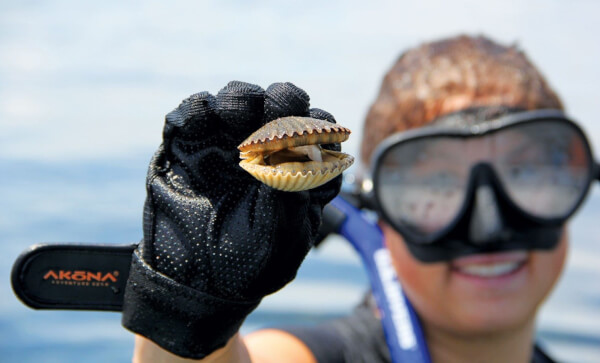Hidden from the endless tracts of condo developments and the annual migration of college students to the Emerald Coast of Florida, are rustic boating towns and fishing villages seemingly out of reach of the crowds. Somehow having managed to retain the old school charm of Florida’s Gulf Coast from the 1960s and 70s, these towns revolve around their quiet beaches, marinas and dockside restaurants where fried conch fritters and grouper baskets are served up with salty charter captains telling tall tales, and where a Jimmy Buffett from 40 years ago could be playing for tips and a bar tab. But just offshore in these pristine bays, hides one of the most unique boating experiences on the entire Gulf Coast.
Once widespread along Florida’s coasts, bay scallops are small, tasty mollusks that have retained footholds along the “Big Bend” of Florida largely due to the undeveloped nature of the region. Protected by barrier islands and fed by a large, marshy estuarine system that contributes to an ideal salinity and habitat, the waters from Port St. Joe to Cedar Key come alive from July to September, with skiffs and runabouts filled with Floridians donning snorkels, flippers and mesh bags to search for these culinary treasures.

On these pristine and shallow bay waters, “diver down” flags pop up above tried and true secret scalloping spots in the sandy turtle grass beds as rays scatter. Bay scallops prefer depths of three to six feet and with native seahorses and even conch hiding in the seagrass, this is a great family oriented adventure. Shallow draft Makos or Boston Whalers are ideal for running to the perfect scalloping areas, but these days you are as likely to see scallopers on kayaks, paddleboards and even jet skis. Local charters will also provide SNUBA gear and goggles for longer underwater foraging.
With commercial harvesting of bay scallops prohibited, the midsummer season of July through September has led to what has become a cultural institution on this coast. Highly susceptible to even minute environmental changes, the harvesting of bay scallops is strictly controlled and fishing licenses are required. A once extensive habitat existed throughout the state, but today isolated populations numerous enough to allow scalloping can only be found in the waters around Port St. Joe, Crystal River, Steinhatchee and Homosassa on Florida’s remote Big Bend.
After long afternoons swimming in the cooling Gulf waters, families and friends anchor or tie up for scallop feasts on the beaches or back porches, with most scallops lightly breaded and seasoned and then flash fried. Similar to an oyster in that it is a mollusk, bay scallops are more muscular because of their ability to actually swim, and their meat is lean and firm. They have a very delicate and sweet flavor, so cooking methods should be light and gentle. More inventive dishes have been making the rounds in the past decades with scallops served in ceviche or lightly broiled and served in beautiful salads and even sliders. Many coastal restaurants will even prepare your fresh catch and simply charge a “corkage” fee for preparing your feast. The true natives will tell you however that bay scallops are best raw right out of the shell with the beautiful water and the white sands of the barrier islands in sight.
For recreational boaters and individuals who wade from shore with dip nets, scalloping is a time honored cultural institution on this stretch of Florida’s coastline. Harkening back to the Florida of the past, bay scallop season is an ideal excuse to trailer your boat down for that beach vacation on Mexico Beach or St. George’s Island, break up those suntan days on the sugar white sand and get your kids and friends out on the water – and then know that you have earned your dinner and that slight sunburn.





